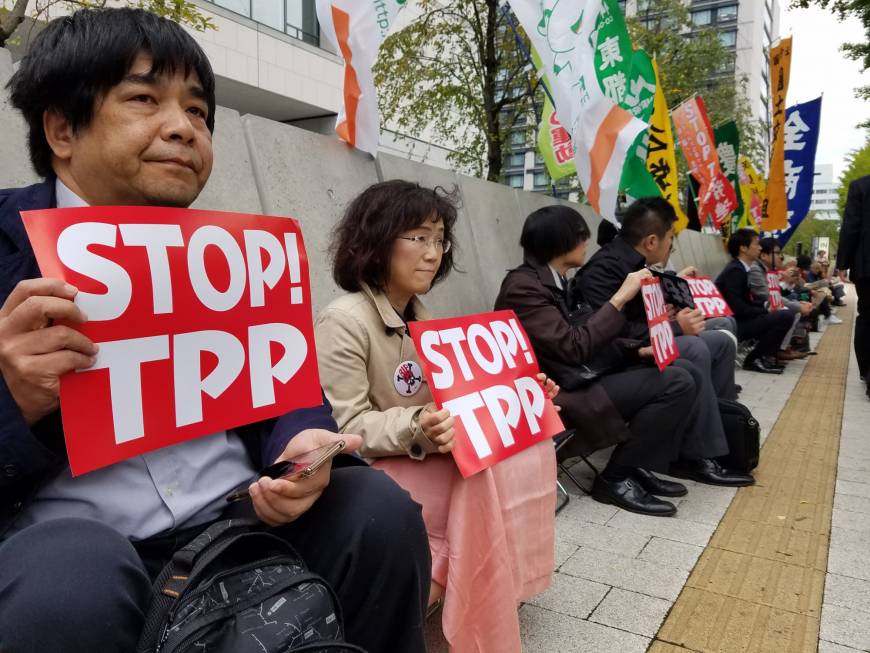Why did Japan’s Parliament ratify ’dead’ TPP agreement?
The Business Times | 12 December 2016
Why did Japan’s Parliament ratify ’dead’ TPP agreement?
by ANTHONY ROWLEY
A CURIOUS thing happened last Friday when the Japanese Parliament voted to ratify Japan’s participation in the Trans-Pacific Partnership (TPP) even though the agreement has been widely proclaimed to be "dead" now that US president-elect Donald Trump has said he plans to pull the United States out of it.
Japanese Prime Minister Shinzo Abe himself has said that the TPP would be "meaningless" without American participation. So why would Japanese legislators be anxious to support an agreement that is supposedly moribund and meaningless?
Was last Friday’s vote simply a Quixotic tribute to a dying cause or - as some are asking - does Mr Abe know something that others don’t? They note that he is the only foreign leader to have met with the anointed heir to the US presidency since the election result was announced.
What went on in New York’s Trump Tower during that "informal" meeting is unknown but some speculate that there may have been some equally informal - but nonetheless significant - dealmaking between the two men on the TPP.
This seems quite possible, analysts say, because the TPP is of great importance to Japan and to Mr Abe’s grand design for Japan to remain a pivotal Asia-Pacific power. It is important too for Mr Abe’s political and economic agenda, and of strategic importance to Washington.
The TPP links a dozen Asia-Pacific nations (including Singapore) in an agreement that is of strong economic importance but which also has considerable geopolitical significance. Some liken it to Asean, which was initially as much a bulwark against Chinese communism as it is an economic pact.
This time, the TPP is a bulwark against fast-expanding Chinese economic and strategic influence in the Asia-Pacific - a region where Mr Abe’s grand design appears at first sight to have been thwarted by Mr Trump’s aggressive "America first" stance.
Mr Trump’s purported intention to tear up the TPP as being not worth the paper it’s written on would appear to have killed Mr Abe’s ambition for Japan and the US to be co-hegemons in East Asia with the US-Japan Mutual Security Treaty matched on the economic side by the TPP.
If the TPP really is dead without the presence of the US, China is free to step in with the RCEP (Regional Comprehensive Economic Partnership) or some other form of FTAAP (Free Trade Area of Asia and the Pacific), where China will be able to offer market access in return for strategic influence.
The stakes in letting the TPP go seem too high for both Tokyo and Washington to retreat, some say. Are they really "letting go" or is it a case of dealmaking on both sides - especially on the part of Mr Trump, who has shown himself to be a consumate dealmaker in the world of real estate?
By declaring that he intends to tear up the existing TPP agreement, Mr Trump stands to scare Mr Abe and other national leaders into making concessions. The TPP gives them access to a market that is vastly larger than their own, individually or collectively, so they want to stay with it.
Now that Mr Trump has said he is heading for the door, they have an incentive to cut a deal. What could emerge, some say, is a "TPP Mark 2" which would be easier for Mr Trump to sell to his US constituents without losing face and being seen to betray a pre-election promise.
Given the relative unpopularity of the TPP with various business and professional interests (ranging from farmers to doctors) that have lobbied strenuously against it, a modified and diluted agreement might also be easier for leaders other than Mr Trump to sell to their voters.
Mr Abe’s position is somewhat ambiguous, however. There is no doubt that Japanese farmers (the more tradition-bound among them, at least) would be delighted to see the TPP watered down. But Mr Abe has been relying on outside pressure or gaiatsu to help him push through domestic reforms.
With its implication of forced market opening in Japan - along the lines of US Navy Commodore Matthew Perry’s "Black Ships" invasion in 1853 - the TPP is an ideal instrument of gaiatsu as far as Mr Abe is concerned, analysts say. But he cannot afford to be heard saying that openly.
The TPP is much more to Mr Abe, however, than simply a lever to open up Japan’s economy. It is a means to keep the US "engaged" economically as well as militarily in East Asia while Japan develops further its own power - economic, diplomatic and military - under the US nuclear umbrella.
Viewed in this light, Mr Abe’s trip to New York can be seen as more than just a dash to be ahead of any other world leader to meet and congratulate the president-elect; it was "strategy-based" - and Mr Trump’s willingness to receive him was an occasion for the new US leader to flex his dealmaking muscle.
What Mr Trump might demand from Japan in return for resuscitating the TPP could be more open access to Japan’s motor vehicle market and to get Japanese carmakers to open more plants in the US. That would please Detroit and those in Congress who have long lobbied for such a move.
So it may be too early to write the words "RIP TPP" as an epitaph to the agreement. In ratifying it, Japan’s Parliament (heavily dominated by Mr Abe’s supporters) has declared its continuing faith in the TPP - while giving a nod and wink to others who fear the agreement is dead.






